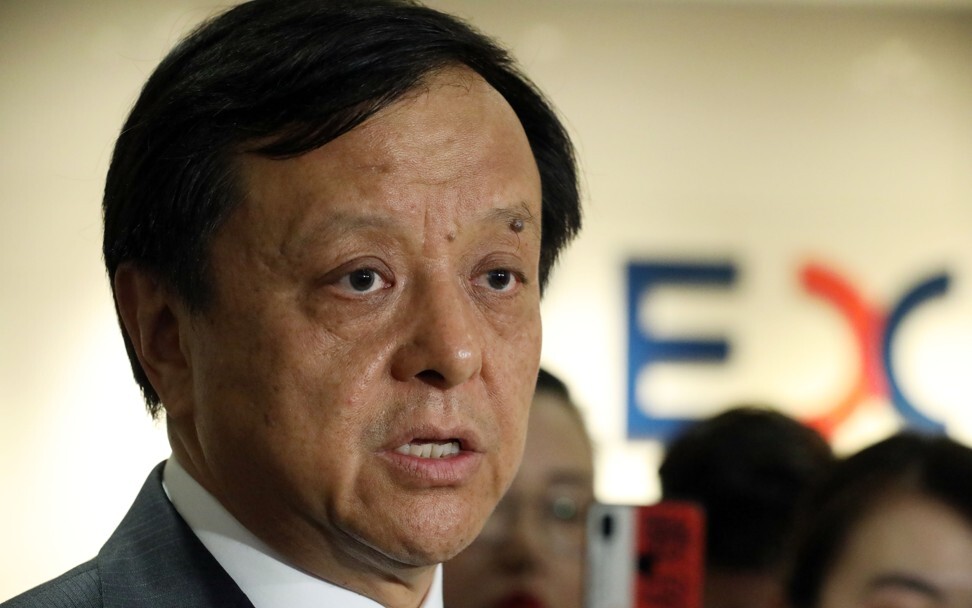
Exclusive | Hong Kong is the key to unlock China’s stocks, where global funds may in time own 25 per cent of market value, Charles Li says
- International investors owned 1.95 trillion yuan of A-shares in Shanghai and Shenzhen via Stock Connect, or 2.8 per cent of the capitalisation of the two mainland markets at the end of July
- Mainland Chinese investors owned HK$1.54 trillion of Hong Kong-listed shares at the end of July, or 3.8 per cent of the total, according to HKEX data
Global investors may eventually hold as much as one fifth, or even up to a quarter, of China’s stock market value over time, and Hong Kong will be the vital link for that access, said the architect of the cross-border investment channel known as the Stock Connect.
The daily amount of international capital investing in the Shanghai and Shenzhen markets via Hong Kong – known as northbound capital in Connect parlance – jumped 69 per cent in the first half to a record 74.3 billion yuan (US$10.83 billion) year on year, fuelling a rally that drove the Shanghai Composite Index’s gain this year to 11.6 per cent as the world’s second biggest winner. First-half southbound capital by Chinese investors tapping Hong Kong-listed shares rose 86 per cent to HK$20.7 billion every day.
“The Stock Connect has become extraordinarily important, [where] we‘re smashing records every quarter,” said Charles Li Xiaojia, chief executive of Hong Kong Exchanges and Clearing Limited (HKEX), the operator of the city’s bourse, during a webinar by South China Morning Post. “I think there is still room to grow for Connect to live up to its potential.”

The Connect scheme involved the collaboration between Hong Kong, with the exchange operators in Shanghai and Shenzhen to allow investors to access each other’s stocks, while keeping China’s capital controls intact.
Since the Shanghai-Hong Kong Connect was launched in November 2014, followed by the Shenzhen-Hong Kong Connect in 2016, a total of 30.64 trillion yuan of global capital had flowed into China’s A-share market, which would otherwise be off limits to overseas investors. Mainland Chinese retail and institutional investors had poured HK$12.2 trillion of money into such Hong Kong-listed shares as HSBC and Tencent Holdings, according to exchange data.
International investors owned 1.95 trillion yuan of A-shares in Shanghai and Shenzhen via Stock Connect, or 2.8 per cent of the capitalisation of the two mainland markets, while mainland investors owned HK$1.54 trillion of Hong Kong-listed shares at the end of July, or 3.8 per cent of the total, according to HKEX data.
Bafang Electric (Suzhou), a component maker for electric bicycles, is one such company. Global investors owned 27.9 per cent of Bafang’s Shanghai-listed A-shares, giving it the highest ratio of foreign ownership out of all companies in the scheme, according to HKEX data.
Another example is Centre Testing International Group, a Shenzhen-listed clinical laboratory, where 20 per cent of its shares are foreign-owned, via the northbound capital from Hong Kong. On the reverse side of the fence, Chinese investors have snapped up 56.6 per cent of the Hong Kong-listed metallurgy company Ganfeng Lithium, a record in the southbound leg of the Connect.
Cross-border turnover will grow to around 20 to 25 per cent of the total, compared with about 5 to 10 per cent nowadays, Li said in the webinar, the second in a six-part series of conversations around the China internet Report 2020 Pro Edition by SCMP Research.
The exchange head maintains a positive outlook despite the fact that Hong Kong’s economy is mired in its worst recession on record. The Chinese legislature’s enactment of a national security law for Hong Kong has not slowed the pace of companies seeking to list on the city’s bourse, even if it threw a pall over sentiments.
Any concern about the national security law has all been “priced in,” Li said. “The market knows that’s something that has to be done, and it just moves on.”


